Showing 11-20 of 21 results
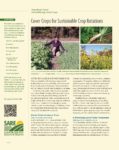
Cover Crops for Sustainable Crop Rotations
Cover crops are one of the best ways to improve soil health, reduce off-farm inputs and protect natural resources. Find a wealth of educational materials developed out of decades of SARE-funded cover crop research.
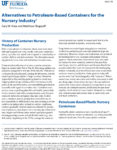
Moving Nursery Producers Toward Sustainable Practices Fact Sheets
These fact sheets discuss alternative containers, marketing and crop selection, alternatives to synthetic herbicides and integrated pest management in commercial nursery plant production.
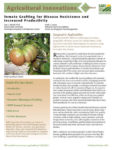
Tomato Grafting for Disease Resistance and Increased Productivity
Researchers around the world have demonstrated that grafting—the fusing of a scion (young shoot) onto a resistant rootstock—can protect plants against a variety of soil-borne fungal, bacterial, viral and nematode diseases invarious climates and conditions.
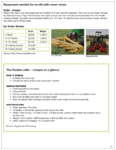
Cover Crops and No-Till Management for Organic Systems
This Rodale Institute fact sheet reviews the use of cover crops and no-till in organic systems, including selection, establishment and mechanical termination of cover crops; crop rotations; and energy and production budgets.
Developing Successful Organic Horticulture Farms: Practical Training for Ag Professionals
A series of Power Point presentations developed for ag professionals on the principles of organic farming, building soil quality, and managing weeds, pests and diseases.
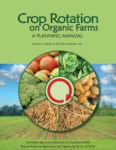
Crop Rotation on Organic Farms
Crop rotation strategies that can be applied under various field conditions for conventional or organic crops to improve soil quality and health, and manage pests, diseases, and weeds
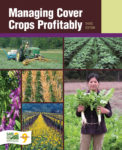
Managing Cover Crops Profitably, 3rd Edition
Managing Cover Crops Profitably explores how and why cover crops work and provides all the information needed to build cover crops into any farming operation.
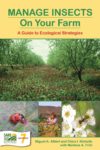
Manage Insects on Your Farm
While every farming system is unique, the principles of ecological pest management apply universally. Manage Insects on Your Farm highlights ecological strategies that improve your farm’s natural defenses and encourage beneficial insects to attack your worst pests.
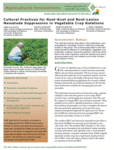
Cultural Practices for Root-Knot and Root-Lesion Nematode Suppression in Vegetable Crop Rotations
This publication discusses the use of non-host crops, sorghum sudangrass and castor bean grown as cover crops, RKN-resistant crops, and the application of poultry litter (PL) and PL compost to manage RKN and root-lesion nematode.
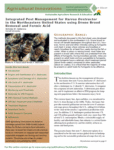
Integrated Pest Management for Varroa Destructor in the Northeastern United States using Drone Brood Removal and Formic Acid
This bulletin focuses on the management of the parasitic honey bee mite Varroa destructor (V. destructor) in the northeastern U.S. It contains information that will allow a beekeeper to: 1) identify V. destructor, 2) recognize the symptoms of mite infestation, 3) determine pest densities, and 4) implement an effective IPM program for keeping mite populations below the economic injury level.